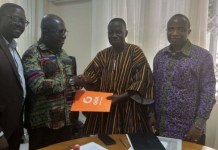An Accra Circuit Court has issued a bench warrant for the arrest of Lawrence Abrokwa, the former husband of Afia Schwarzenegger for failing to appear before it.
The court presided over by Mrs. Justice Abena Oppong Adjin-Doku, a High Court judge siting as an additional Circuit court judge, was expected to deliver its judgement today in the case in which Abrokwa was being held on two counts of domestic violence to wit emotional, verbal and psychological abuse, threat of harm, assault, publication of obscene material, carrying offensive weapon, causing unlawful damage and stealing.
Abrokwa at the last sitting failed to appear in court and the trial judge adjourned the matter to Monday March 23, 2020.
When the case was called on Monday, the accused’s counsel told the court that he has made several calls to the accused but to no avail.
The court therefore issued a bench warrant for his arrest and adjourned the matter to April 1.
Sergeant Opoku Aniagyei held the brief of the Prosecuting officer, Chief Inspector Kofi Atimbire.
The accused had pleaded not guilty and was granted bail in the sum of GH¢20,000.00 bail with three sureties, who should be gainfully employed.
The Prosecution had earlier told the Court that the complainant, Afia Schwarzenegger, and Abrokwa were legally married and lived together at Dome Pillar Two, a suburb of Accra, in the house of the complainant.
According to the Prosecution, about three weeks before the domestic incident, Abrokwa packed his things and left the house for Dansoman, following persistent misunderstanding between them.
He said on August 29, 2017, Abrokwa was informed by their house help, one Afia Nyamekye, there is a male visitor with her mistress who would be spending the night with her.
The Prosecution said based on this information, Abrokwa armed himself with a kitchen knife and a bottle containing some liquid purported to be acid.
The prosecution said Abrokwa proceeded to the house of the complainant, scaled the wall and entered the compound.
He said the accused found a strange private car, which he believed belongs to the visitor parked on the compound, deflated two tyres of the said car, and entered the house through the back door, with the assistance of the house help.
He said the accused entered the bedroom with his mobile phone and forced the bedroom door opened and found Afia and her male visitor naked in bed.
The Prosecution said Abrokwa threatened them to stay put as he had found them for him to video them, or else he would pour acid on them to cause harm to their bodies.
Prosecution said the male visitor managed to escape during the confrontation, but Afia was prevented by Abrokwa, who ordered her to go on her knees, to declare herself as a prostitute, while he held the bottle of the alleged acid in his hand.
He said Afia obliged to his instructions, while Abrokwa continued his video filming of the complainant in her nudity amidst pleas from her to stop.
The Prosecution said in the process, Abrokwa assaulted Afia and chased her out of the house.
He said Afia escaped to a neighbour, who eventually clothed her.
The Prosecution said the accused then transmitted the nude videos of his wife to his second mobile phone before reporting the matter to the Police with all the items belonging to the visitor and the first phone used for the video.
He said when the complainant went to the house later, she alleged that her bedside drawer had been forced opened and 2,000 dollars and 500 pounds had been taken by the accused.
He said the complainant reported the matter to the Police and Abrokwa was arrested, cautioned and granted bail later.
According to Prosecution, whilst the case was being investigated, Abrokwa transmitted the video from his phone to Afia’s father on his phone on September 1, 2017.
He said the video, however, went viral on social media and the bottle containing the said acid was sent to the Ghana Standard Authority (GSA) for examination.
He said on September 13, 2017, the Police received a report from the GSA that the content in the bottle was water and not acid.
Source: GNA










